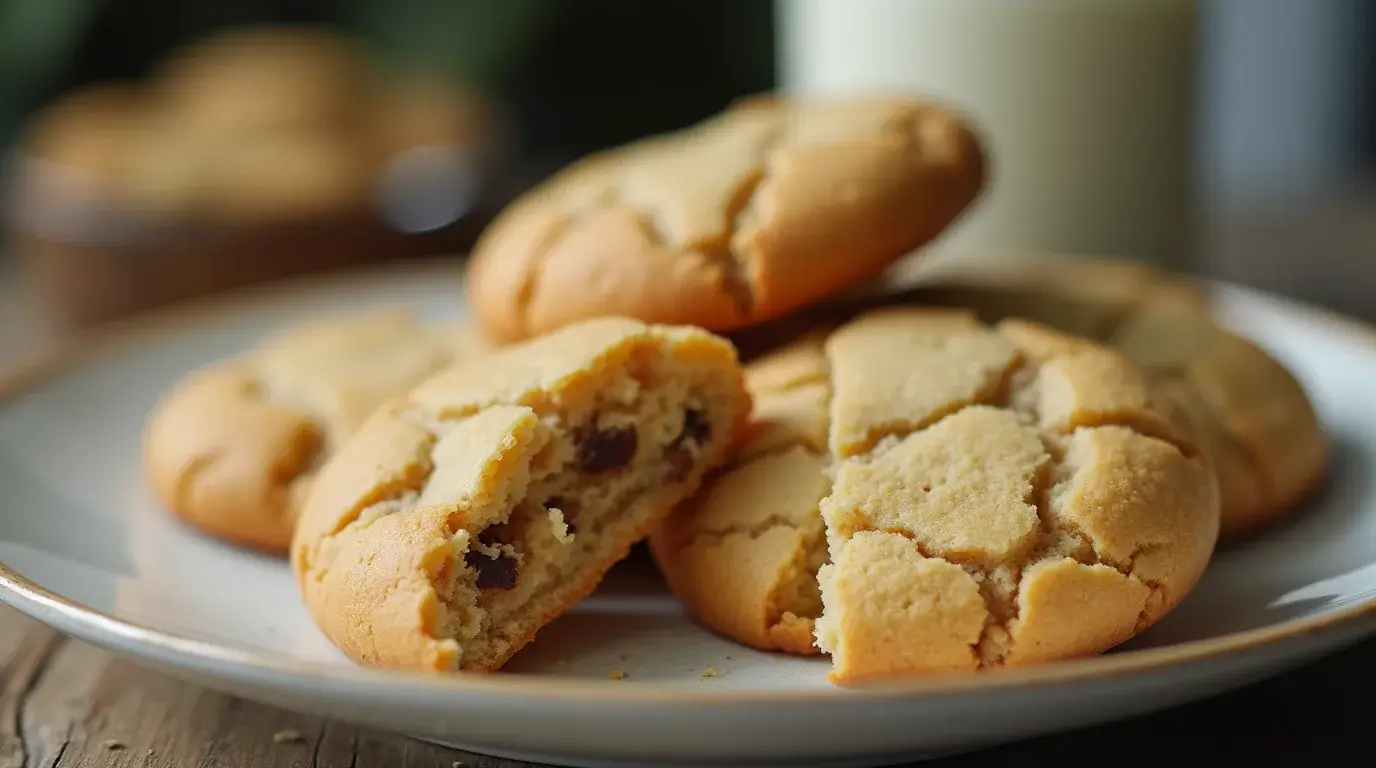Cookies are a beloved treat worldwide, but there’s one question every baking enthusiast has asked at least once: What is the secret ingredient to keep cookies soft? From the choice of ingredients to how they’re stored, the factors influencing cookie softness are surprisingly diverse. This article dives deep into the science and art of creating and preserving irresistibly soft cookies. We’ll explore why cookies harden over time, reveal the secret ingredient that makes all the difference, and share expert tips for consistently chewy results. Let’s get started!
Why Do Cookies Become Hard Over Time?
Cookies fresh out of the oven are a dream: soft, warm, and chewy. But as time passes, many cookies lose their softness. What’s going on here? The answer lies in a mix of science and practice.
Understanding the Science Behind Soft Cookies
Cookies harden primarily due to moisture loss. When cookies are baked, water content from the dough evaporates, leaving them delightfully firm on the outside but soft on the inside. Over time, this remaining moisture continues to escape into the air, causing the cookies to harden further.
The choice of ingredients also plays a role. Fats like butter and oils help retain moisture, while sugars, especially brown sugar, act as humectants that hold onto water. However, if the ratios aren’t right, the cookies can dry out faster than desired.
How Environment Impacts Cookie Softness
Ever notice how cookies stored in humid environments seem to harden more quickly? That’s because exposure to air accelerates moisture loss, especially in environments with varying temperatures. Similarly, improper storage—such as leaving cookies uncovered or in loosely sealed containers—can speed up the hardening process.
Understanding these factors is key to preventing cookie heartbreak and ensuring your treats stay deliciously soft. But don’t worry, we’ve got more secrets to share. In the next section, we’ll reveal the ultimate ingredient that keeps cookies soft and chewy for longer. Stay tuned!
The Secret Ingredient to Keep Cookies Soft
Every baker knows the joy of biting into a soft, chewy cookie. But what is the secret ingredient to keep cookies soft? The answer might surprise you—it’s all about using ingredients that lock in moisture and enhance texture.
Cornstarch: The Best Secret for Soft and Chewy Cookies
Cornstarch might not be the first ingredient that comes to mind when you think of cookies, but it’s a game-changer. This pantry staple works wonders for creating tender, melt-in-your-mouth cookies. When added to cookie dough, cornstarch softens the flour’s protein structure, resulting in a dough that spreads less and stays chewy.
For best results, replace a small portion of your flour (about 1-2 tablespoons) with cornstarch. This subtle change makes cookies thicker, softer, and irresistibly moist. Popular recipes like snickerdoodles and chocolate chip cookies often include cornstarch to achieve that perfect texture. Give it a try in your next batch, and you’ll taste the difference.
Alternative Softening Agents
If cornstarch isn’t your thing, there are other ways to keep your cookies soft. Brown sugar, for instance, is a natural humectant that retains moisture better than granulated sugar. Similarly, liquid sweeteners like honey or molasses can add both flavor and softness.
Some bakers even swear by adding a dollop of cream cheese or sour cream to their dough. These dairy products introduce extra fat and moisture, making cookies richer and softer. No matter which method you choose, the key is to experiment and find what works best for your recipe.
With cornstarch and other softening agents in your toolkit, you’re one step closer to perfect cookies. But how you bake them matters too. Let’s move on to Part 3 to explore baking techniques that maximize cookie softness.

Baking Techniques for Soft Cookies Every Time
The secret to soft cookies isn’t just in the ingredients—it’s also in the technique. Master these simple baking tips, and you’ll never have to worry about dry cookies again.
How Dough Preparation Affects Cookie Softness
It all starts with how you handle the dough. One of the best tricks for softer cookies is chilling the dough before baking. Cold dough spreads less in the oven, which helps keep the center soft and chewy. A quick 30-minute chill in the fridge can make a huge difference.
Another crucial step is mixing the dough just right. Overmixing can lead to tough cookies by activating too much gluten in the flour. For a tender texture, mix until the ingredients are just combined—no more, no less.
Baking Adjustments to Keep Cookies Soft
Baking is as much science as it is art. To keep cookies soft, slightly underbake them. When the edges are set but the center looks slightly underdone, pull them out. Residual heat from the baking sheet will continue to cook them gently.
Additionally, using parchment paper or silicone baking mats can help retain moisture. These tools prevent cookies from overbaking on the bottom, ensuring they stay soft all over.
With the right techniques, your cookies will not only be soft out of the oven but stay that way for days. In the next part, we’ll dive into how to store your cookies to preserve that bakery-fresh softness.
How to Store Cookies to Keep Them Soft Longer
Even the best-baked cookies can harden if they aren’t stored correctly. Learning how to store your cookies properly is key to keeping them as soft and delicious as the day they were made.
Best Storage Practices to Keep Cookies Soft
The type of container you use can make or break your cookie-storing game. To preserve moisture, always store cookies in airtight containers or resealable plastic bags. Containers with a secure lid prevent air from drying out the cookies. For an added layer of protection, place wax paper or parchment between cookie layers to keep them from sticking.
Avoid leaving cookies exposed on plates or in loosely covered tins. These methods allow air to circulate, which accelerates moisture loss. If you want your cookies to remain tender, seal them tightly and keep them in a cool, dry place.
Adding Moisture Back Into Stored Cookies
Sometimes, despite your best efforts, cookies start to lose their softness. Don’t worry—there are quick fixes! One tried-and-true trick is to place a slice of bread in the container with the cookies. The bread helps restore moisture by releasing humidity into the container. A slice of apple works similarly and adds a hint of fruity aroma.
For an immediate fix, pop a cookie in the microwave for a few seconds. This warms up the cookie, making it taste soft and fresh again. Be careful not to overdo it, as overheating can make the cookie tough.

For more delicious recipes, check out this easy 4-ingredient Almond Joy cookie recipe.
FAQ Section: Common Questions About Cookie Softness
Let’s address some of the most frequently asked questions about keeping cookies soft and chewy.
What is the trick to making soft cookies?
The trick to making soft cookies lies in maintaining moisture. Using ingredients like brown sugar, which retains water, and butter for richness is essential. Incorporating a small amount of cornstarch into the dough also helps create a tender texture. Additionally, slightly underbaking the cookies and letting them finish cooking with residual heat keeps them soft and chewy.
How do you keep cookies from getting hard after baking?
To prevent cookies from getting hard after baking, proper storage is key. Place them in an airtight container or resealable bag to keep moisture in. Adding a slice of bread or an apple wedge to the container can introduce moisture and keep cookies soft longer. Avoid exposing cookies to air or placing them in the refrigerator, which can dry them out.
What ingredient makes a cookie soft?
Several ingredients contribute to soft cookies, but the most impactful ones are cornstarch and brown sugar. Cornstarch softens the flour proteins, creating a tender texture, while brown sugar acts as a humectant, helping cookies retain moisture. Adding extra egg yolks or using cream cheese are other effective ways to make cookies soft and rich.
How do bakeries keep their cookies soft?
Bakeries use several tricks to keep their cookies soft. They often rely on high-quality ingredients like butter and brown sugar to retain moisture. Many also chill the dough before baking, ensuring a thick and chewy texture. After baking, they store cookies in airtight containers and may add a slice of bread or other moisture-locking methods to maintain softness for longer periods.
Expert Tips for Consistently Soft Cookies
Baking cookies that stay soft isn’t just about following a recipe—it’s about knowing the tips and tricks that truly make a difference. If you’ve ever wondered what is the secret ingredient to keep cookies soft, these expert tips will ensure your cookies are consistently chewy and tender.
Choosing the Right Ingredients
The quality of your ingredients directly impacts your cookie’s texture. Using high-quality fats, like European-style butter, adds richness and helps retain moisture. Additionally, consider swapping some of the granulated sugar for brown sugar, which is a natural humectant that holds onto water.
For an extra-soft texture, experiment with cake flour instead of all-purpose flour. Cake flour has a lower protein content, which creates a tender, melt-in-your-mouth cookie. A small adjustment in your ingredient choices can make all the difference.
Customizing Recipes for Softness
Not all cookie recipes are created equal, but a few tweaks can make them softer. For instance, add an extra egg yolk to your dough—egg yolks contain fat that enhances moisture and richness. Another trick is to slightly increase the butter-to-flour ratio for a softer bite.
If your dough feels too dry, try adding a teaspoon of milk or cream. This small adjustment adds moisture without altering the dough’s consistency. With these simple changes, you can transform even a basic cookie recipe into a soft and chewy masterpiece.

Bringing It All Together: The Secrets to Soft Cookies
So, what’s the ultimate answer to what is the secret ingredient to keep cookies soft? It’s not just one thing but a combination of thoughtful choices and techniques. From incorporating cornstarch to using brown sugar, the right ingredients can lock in moisture and create the perfect texture. Pair these with expert baking methods, like chilling dough and underbaking slightly, and your cookies will stay irresistibly soft.
Don’t forget, proper storage is key to extending the life of your cookies. Airtight containers and clever tricks like adding a slice of bread can keep cookies soft for days. If you want to explore more creative baking ideas, try this banana chocolate cake recipe for a soft and moist treat.
With these tips in your back pocket, you’ll never have to worry about dry, crumbly cookies again. Whether you’re baking for yourself or sharing with loved ones, every bite will be a testament to your cookie-baking mastery. Now, it’s time to preheat that oven and put these secrets to work!

